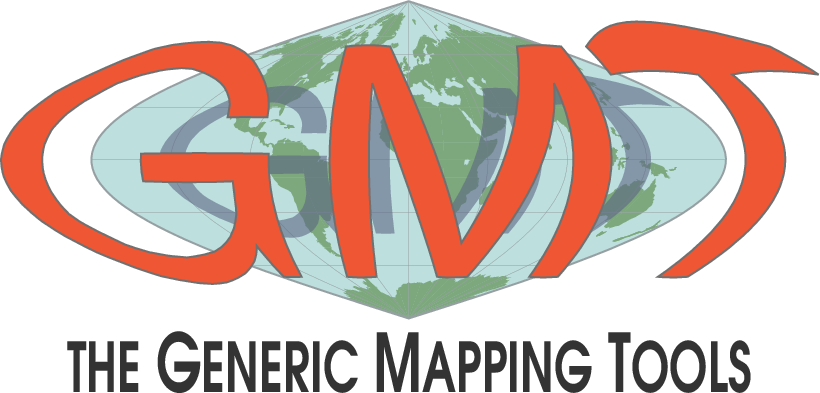gmtlogo¶
Plot the GMT logo
Synopsis¶
gmtlogo [ -D[g|j|J|n|x]refpoint+wwidth[+jjustify][+odx[/dy]] ] [ -F[+cclearances][+gfill][+i[[gap/]pen]][+p[pen]][+r[radius]][+s[[dx/dy/][shade]]] ] [ -Jparameters ] [ -K ] [ -O ] [ -P ] [ -Rwest/east/south/north[/zmin/zmax][+r][+uunit] ] [ -S[l|n|u] ] [ -U[stamp] ] [ -V[level] ] [ -X[a|c|f|r][xshift] ] [ -Y[a|c|f|r][yshift] ] [ -ttransp ] [ --PAR=value ]
Note: No space is allowed between the option flag and the associated arguments.
Description¶
This module plots the GMT logo on a map. By default, the GMT logo is 144 points (2 inches wide) and 72 points (1 inch) high and will be positioned relative to the current plot origin. Use various options to change this and to place a transparent or opaque rectangular map panel behind the GMT logo.

Standard presentation of the GMT logo.¶
Required Arguments¶
None.
Optional Arguments¶
- -D[g|j|J|n|x]refpoint+wwidth[+jjustify][+odx[/dy]]
Sets reference point on the map for the image using one of four coordinate systems: (1) Use -Dg for map (user) coordinates, (2) use -Dj or -DJ for setting refpoint via a 2-char justification code that refers to the (invisible) map domain rectangle, (3) use -Dn for normalized (0-1) coordinates, or (4) use -Dx for plot coordinates (inches, cm, etc.). All but -Dx requires both -R and -J to be specified. Use +wwidth to set the width of the GMT logo in plot coordinates (inches, cm, etc.). By default, the anchor point on the GMT logo is assumed to be the bottom left corner (BL), but this can be changed by appending +j followed by a 2-char justification code justify (see text). Note: If -Dj is used then justify defaults to the same as refpoint, if -DJ is used then justify defaults to the mirror opposite of refpoint. Add +o to offset the GMT logo by dx/dy away from the refpoint point in the direction implied by justify (or the direction implied by -Dj or -DJ).
-F[+cclearances][+gfill][+i[[gap/]pen]][+p[pen]][+r[radius]][+s[[dx/dy/][shade]]]
Without further options, draws a rectangular border around the GMT logo using MAP_FRAME_PEN. The following modifiers can be appended to -F, with additional explanation and examples provided in the The background panel cookbook section:
+cclearance where clearance is either gap, xgap/ygap, or lgap/rgap/bgap/tgap and gap gives a uniform clearance, xgap/ygap gives separate clearances in the x- and y- directions, and lgap/rgap/bgap/tgap gives individual clearances between the map embellishment and the border for each side.
+gfill to fill the box with a color specified by fill [default is no fill].
+i[[gap/]pen] to draw a secondary, inner border as well. Optionally, specify the gap between the inner and outer border and the pen for the inner border [default is a uniform gap between borders of 2p and the MAP_DEFAULT_PEN].
+ppen to specify different pen attributes.
+r[radius] to draw rounded rectangular borders instead with a corner radius set by radius (append units) [defaults is 6p].
+s[[dx/dy/][shade]] to draw an offset background shaded region. Here, dx/dy indicates the shift relative to the foreground frame [default is 4p/-4p] and shade sets the fill style to use for shading [default is gray50].
- -Jparameters (more …)
Select map projection.
- -Rxmin/xmax/ymin/ymax[+r][+uunit] (more …)
Specify the region of interest.
For perspective view -p, optionally append /zmin/zmax. (more …)
- -S[l|n|u]
Control what is written beneath the map portion of the logo. Append l (or skip -S entirely) to plot the text label “The Generic Mapping Tools” beneath the logo. Append n to skip the label placement, and append u to place the URL to the GMT site instead [plot the label].
- -U[label][+c][+jjust][+odx/dy] (more …)
Draw GMT time stamp logo on plot.
- -V[level] (more …)
Select verbosity level [w].
-X[a|c|f|r][xshift]
- -Y[a|c|f|r][yshift] (more …)
Shift plot origin.
- -ttransp[/transp2] (more …)
Set transparency level(s) in percent.
- -^ or just -
Print a short message about the syntax of the command, then exit (NOTE: on Windows just use -).
- -+ or just +
Print an extensive usage (help) message, including the explanation of any module-specific option (but not the GMT common options), then exit.
- -? or no arguments
Print a complete usage (help) message, including the explanation of all options, then exit.
- --PAR=value
Temporarily override a GMT default setting; repeatable. See gmt.conf for parameters.
Classic Mode Arguments¶
These options are used to manipulate the building of layered GMT PostScript plots in classic mode. They are not available when using GMT modern mode.
- -K (more …)
Do not finalize the PostScript plot.
- -O (more …)
Append to existing PostScript plot.
- -P (more …)
Select “Portrait” plot orientation.
Examples¶
To plot the GMT logo of a 144-point width as a stand-alone plot, use:
gmt logo -P > logo.ps
To append a GMT logo overlay in the upper right corner of the current map, but scaled up to be 6 cm wide and offset by 0.25 cm from the border, try:
gmt logo -O -K -R -J -DjTR+o0.25c+w6c >> bigmap.ps